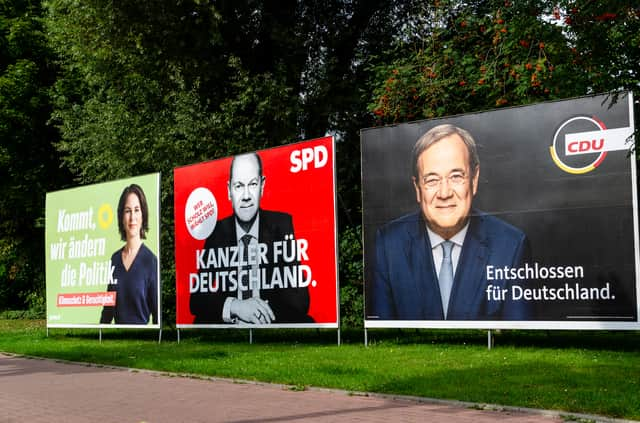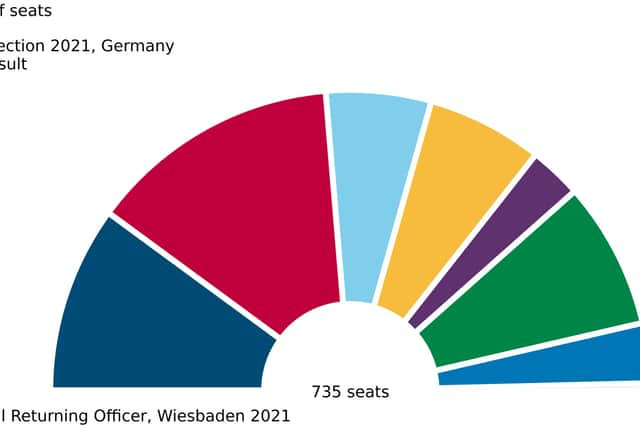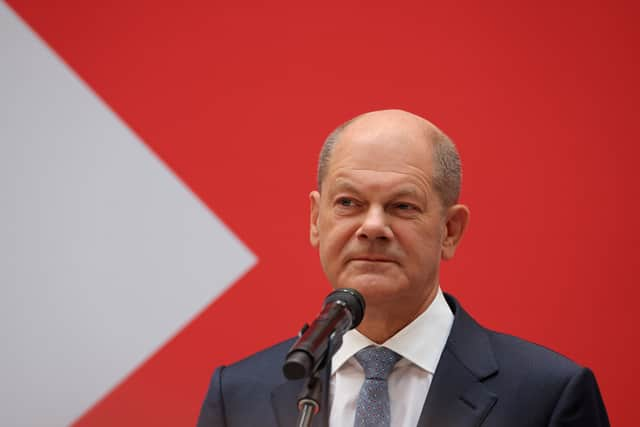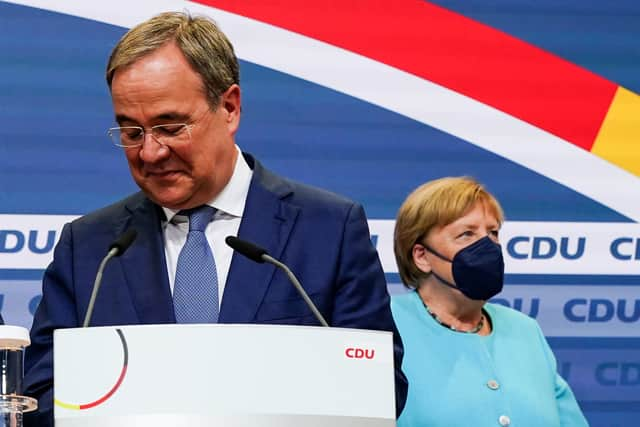Who won the German federal election 2021? Results explained - and who is SPD Chancellor candidate Olaf Scholz?
This article contains affiliate links. We may earn a small commission on items purchased through this article, but that does not affect our editorial judgement.


The centre-left Social Democrats (SPD) have secured a narrow victory over outgoing Chancellor Angela Merkel’s Christian Democratic Union in Germany’s federal elections.
Olaf Scholz is the candidate for Chancellor for the SPD, which took just over 25% of the vote.
Advertisement
Hide AdAdvertisement
Hide AdMeanwhile, the centre-right Christian Democratic Union (CDU) led by Armin Laschet, and the Christian Social Union (CSU) which it partners with had 24% of the vote - the worst result for the union bloc in a national election.
Talks will now take place to form a coalition.
Negotiations could see the SPD form a government with the Free Democratic Party (FDP) led by Christian Lindner and The Greens co-led by Annalena Baerbock and Robert Habeck.
The elections marked the end of Angela Merkel’s term. She has served four terms as the country’s Chancellor, but had previously announced she would not seek a fifth term.
What are the federal elections and what is the Bundestag?
The federal elections are held to decide the make-up of the Bundestag, which is the German federal parliament. It is the only federal representative body directly elected by the people.
Advertisement
Hide AdAdvertisement
Hide AdElections take place every 46 months, however if the term of the Bundestag ends early, new elections have to take place within 60 days.
The electoral term of the 19th German Bundestag started on 24 October 2017, which meant the election had to take place between 25 August 2021 and Sunday, 24 October.
Election day has to be on a Sunday or a public holiday and shouldn’t take place during the main holiday seasons.
What were the election results?
According to The Federal Returning Officer the provisional results show the SPD took 206 of the 735 seats. The CDU, which partners with the CSU party, secured 196 seats.
Advertisement
Hide AdAdvertisement
Hide AdThe provisional results show the SPD has 25.7% of the vote, up 5.2% from 2017, while the CDU/CSU has 24.1%. The CDU itself had 18.9%, which is a fall of 7.9% from the last election.
Meanwhile the Greens took 14.8%, an increase of 5.8% and the FDP had 11.5% of the vote - up 0.7%.
The nationalist Alternative for Germany (AfD) took 10.3% of the vote (83 seats), meaning they were down 2.3%. The right wing party is known for its opposition to the European Union and immigration.


Who is Olaf Scholz?


Mr Scholz is the candidate for Chancellor of Germany of the SPD. Since March 2018 he has been the country’s Vice Chancellor and the Federal Minister of Finance.
Advertisement
Hide AdAdvertisement
Hide AdHe carried out these roles as part of a coalition formed with the CDU and members of the SPD in 2017.
The co-leaders of the SPD are Saskia Esken and Norbert Walter-Borjans
The SPD and CDU/CSU, which have been the two major political parties in Germany since 1949, have formed grand coalitions on previous occasions.
Mr Scholz, who is a lawyer and served as First Mayor of Hamburg from 2011-2018, ran on a joint ticket with Klara Geywitz for the dual leadership of the SPD in 2019, however he lost to the current co-leaders.
Advertisement
Hide AdAdvertisement
Hide AdHe then stepped down from his post as deputy leader of the party.
It looks likely the SPD will try to form a coalition government with the Greens and FDP.
Mr Scholz said: “The voters have strengthened three parties in the federal government: FDP, Greens and SPD. The signal: you should lead the next government. Leadership is now required.”
In a sign of what may be on the agenda during any coalition talks, co-leader of the Greens, Annalena Baerbock, said: “The next government has to be a climate government. We will do all we can to achieve this.”
Who is Armin Laschet and what is the CDU/CSU?
Advertisement
Hide AdAdvertisement
Hide AdMr Laschet is the Minister-President of North Rhine-Westphalia and was elected leader of the Christian Democratic Union in January this year.
It was confirmed in April he would be the CDU/CSU candidate for Chancellor.
The CDU/CSU is an alliance of two centre-right parties - the Christian Democratic Union of Germany and the Christian Social Union of Bavaria. Of the two, the CSU is considered to be more socially conservative.


How many people voted?
The Federal Returning Officer said on Sunday at 2pm prior to the polls closing at 6pm that there had been a 36.5 % voter turnout in the ballot-box poll.
Advertisement
Hide AdAdvertisement
Hide AdIn the 2017 Bundestag Election, voter turnout had been 41.1 % at the same hour. The figure does not include postal votes.
Federal Returning Officer Georg Thiel. said: “The voter turnout now determined is lower than in 2017, as was expected, because we expect a markedly higher share of postal voters. Their voter turnout will be calculated later when determining the final election result.”
In the last Bundestag election of 2017, voter turnout was 76.2 % according to the official final result.
We want to hear from you: let us know what you think about this story and be part of the debate in our comments section below
A message from the editor:
Advertisement
Hide AdAdvertisement
Hide AdThank you for reading. NationalWorld is a new national news brand, produced by a team of journalists, editors, video producers and designers who live and work across the UK. Find out more about who’s who in the team, and our editorial values. We want to start a community among our readers, so please follow us on Facebook, Twitter and Instagram, and keep the conversation going. You can also sign up to our email newsletters and get a curated selection of our best reads to your inbox every day.
Comment Guidelines
National World encourages reader discussion on our stories. User feedback, insights and back-and-forth exchanges add a rich layer of context to reporting. Please review our Community Guidelines before commenting.